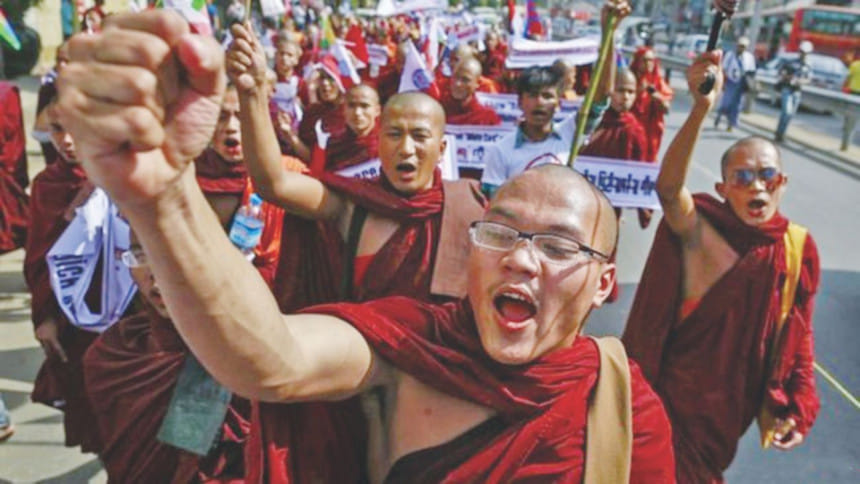Countering the other fundamentalism

In view of the grisly and gory attacks, allegedly state-sponsored, on the Rohingya Muslim minority of neighbouring Myanmar, it would not be out of place to take a serious look at the menacing face of the other kind of fundamentalism about which the international community has not been desirably vocal. Incidentally, the word 'fundamentalism' has often been used and expressed in a pejorative sense.
For the ease of understanding, can we term the embattled and frequently intolerant religiosity as fundamentalism? Are the so-called fundamentalists departing from the core values of compassion, justice, and benevolence that characterise all the world faiths including Islam and Buddhism too? One could raise such a query as the myth of the supposed fanatical intolerance of Islam has become one of the accusatory ideas of the west.
The Western media often gives the impression that the embattled and occasionally violent form of religiosity known as 'fundamentalism' is a purely Islamic phenomenon. This is not the reality. Fundamentalism is a global fact and has surfaced in every major faith in response to issues and problems of modernity. There is fundamentalist Judaism, fundamentalist Christianity, fundamentalist Hinduism, fundamentalist Buddhism, fundamentalist Sikhism, and even fundamentalist Confucianism.
Coming to the specific issue of the persecution of Muslims in Myanmar, a responsible United Nations official has described it as ethnic cleansing while others have not hesitated to call it a planned genocide; and this alleged extermination of a distinct ethnic and religious entity is taking place in a Buddhist majority country where ironically, the monks are known for their courageous stand against military dictatorship and active commitment to democracy, but in the recent past have now turned dangerously virulent on a helpless religious minority.
The repression on the Muslim minority is both repulsive and deeply saddening because Siddhartha Gautama, the founder of Buddhism, wandered into the world in search of understanding. He renounced his princely title and became a monk in the hope of comprehending the truth of the world around him. Gautama was known as the Buddha meaning the "Enlightened One".
It would be relevant to recollect that the cardinal practice of Buddhism consists of 'Sila' which means virtue, good conduct and morality. The 'Sila' is based on two fundamental principles:
Firstly, the Principle of Equality: that all living entities are equal. Secondly, the Principle of Reciprocity: to do onto others as you would wish them to do onto you. The Buddha's Four Noble Truths explore human suffering. The foremost Buddhist precept to live by is "Do not kill". This is translated as "Not harming" or an absence of violence. Righteous action in Buddhism, inter-alia, includes moral restraint refraining from committing violent acts.
Of all the moral precepts instilled in Buddhist monks the promise not to kill comes first, and the principle of non-violence is arguably more central to Buddhism than any other major religion. So why have monks been using hate speech against Muslims and joining mobs that have left dozens dead?
The hostiliy in Myanmar is spearheaded by the 969 group, led by a monk, Ashin Wirathu, who was jailed in 2003 for inciting religious hatred. Released in 2012, he has referred to himself bizarrely as "the Burmese Bin Laden". The question is, are not Buddhist monks meant to be the good guys of religion? As mentioned earlier, aggressive thoughts are inimical to all Buddhist teachings. Buddhism even comes equipped with a practical way to eliminate them. Through meditation the distinction between your feelings and those of others should begin to dissolve, while your compassion for all living things grows.
The ground reality is that however any religion starts out, sooner or later it enters into a Faustian pact with state power. Buddhist monks looked to kings, the ultimate wielders of violence, for the support, patronage and order that only they could provide. Kings looked to monks to provide the popular legitimacy that only such a high moral vision can confer. The end result would appear ironic because if there is a strong sense of the overriding moral superiority of one's world view, then the need to protect and advance it can seem the most important duty of all.
Discerning citizens of the world would hope that the Buddhist monks, a very important plank in Myanmar's struggle for democracy, would rise to the occasion and stick to the teachings of all the Buddhas – 'not to do any evil; to cultivate good; to purify one's heart.' Buddhists value wisdom and compassion most, of all virtues. Let Buddhist monks of Myanmar stand high and prove once again that Ahimsa or harmlessness is very closely connected with compassion. They surely can ascend the high moral ground by effectively helping to shake-off the racist rage driven bigotry.
The writer is a columnist of The Daily Star.

 For all latest news, follow The Daily Star's Google News channel.
For all latest news, follow The Daily Star's Google News channel. 



Comments